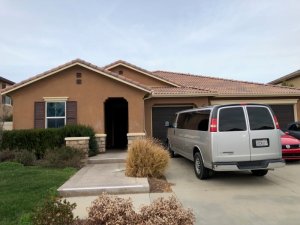Ina Rogers admits some people may not agree with home schooling but said she and her husband pride themselves on being good parents.
“My husband is an amazing person,” she recently told CNN affiliate KGO/KTXL. “I am an amazing mother.”

But Rogers and her husband Jonathan Allen are facing charges of child neglect, torture and abuse after their 10 children — who range in age from 4 months to 11 years old — were found to have puncture wounds, burns and bruising as well as injuries consistent with being shot by pellet guns or BB guns. The parents have denied wrongdoing in interviews with local media.
A police search of the Northern California home where the family lived turned up garbage and spoiled food along with feces and urine on the floor.
“They had normal lives except for being in home school,” Allen told KGO/KTXL. “I gave my everything to these children.”
The arrests come four months after another California couple was accused of holding their children captive in filthy conditions. David Turpin and his wife Louise, 49, face charges of torture and child endangerment stemming from the conditions in which their children were found in the couple’s Perris home in Riverside County. The Turpin children were also home-schooled.
The Fairfield case raises more questions about home-schooling regulations in many states, which some experts say are too lenient.
‘Gives all the freedom to the parents’
“The thing in all of this is — it’s up to the parents,” said Rachel Coleman, executive director of the Massachusetts-based Coalition for Responsible Home Education.
“Home schooling doesn’t give any freedom to the kids,” she told CNN after the Turpins were arrested. “It gives all the freedom to the parents. In the hands of good parents, the kids can benefit and thrive. But in the hands of parents like the Turpins, it can be the complete opposite.”

The Turpins have pleaded not guilty to more than 40 charges, including torture, false imprisonment, abuse of a dependent adult and child abuse. David Turpin also pleaded not guilty to one count of lewd conduct with a minor.
David Turpin listed himself as administrator and principal of a private school operated out of his home. He gave it an inviting name: Sandcastle Day School.
The engineer started the school by simply filling out a Department of Education affidavit stating that his children were attending full-time. Nothing more was required in California, and the state has no authority to monitor or inspect the school.
Inside the so-called home school, investigators said, at least three siblings were shackled to beds with chains and padlocks in foul-smelling quarters. The 13 siblings range in age from 2 to 29.
In Fairfield, it doesn’t appear that Rogers and Allen registered their home school with the California Department of Education.
‘Completely off the radar’

California is one of 15 states requiring that parents merely register with education authorities, according to the home education coalition, which has pushed for greater oversight. Other states with similar requirements include Nevada, New Mexico and Wisconsin.
Eleven other states, including Illinois, New Jersey and Connecticut, require no documentation.
“There is no list anywhere of who’s being home-schooled in those states,” said Coleman, who, like most of the staff and board of the coalition, was home-schooled.
“Parents aren’t required to have any contact with education officials at all. There’s no follow up. They’re completely off the radar.”
Coleman said various states — including Pennsylvania, Ohio, Michigan and Kentucky — have proposed legislation in the last five years calling for greater oversight — ranging from criminal background checks for parents to mandatory contacts with certified teachers and doctors.
“None of these bills have passed,” she said. “But an increasing number are being introduced with a regularity, that is encouraging.”
In the Turpin case, it’s unclear whether a background check would have helped. Neither law enforcement nor child protective services had been called to the home in the past, officials said.
Riverside County Department of Public Social Services Director Susan von Zabern said the incident “was the first opportunity we had to intervene.”
“What’s making home schooling look bad is cases like this,” Coleman said.
“And the absolute way to improve the image of schooling would be to create laws to prevent these things from happening.”
‘Everybody should be appalled’

Coleman said the coalition has recommended that states require home-schooled children to meet with “mandatory reporters” such as doctors and certified teachers. The nonprofit has also advocated routine checks for criminal records and cases involving child protective services.
“The thing about home schooling is you have some really extreme haves and have nots,” she said. “Some home schooling families do more than an excellent job. Their kids are taking college classes in high school, innovative curriculum and getting to travel.”
And then there are cases like Sandcastle Day School and the home of Ina Rogers and Jonathan Allen in Fairfield.
The organization has cataloged nearly 400 cases, most since 2000, involving severe to fatal abuse of what it calls “home schooling’s invisible children,” Coleman said.
“There are kids out there right now — I guarantee you — who are currently chained to their beds,” she said. “I can say that because these cases keep coming up.”
But Scott Woodruff, senior counsel with the Home School Legal Defense Association, said home schooling is not a risk factor for child abuse. A higher level of regulation would not help children, he added.
“The Turpin situation is obviously a horrible situation,” he said.
“Everybody should be appalled. But being appalled and being horrified, while they’re absolutely necessary as a way of socially condemning what happened … they aren’t a good foundation for long-term policy.”
On Tuesday, Rogers was charged with nine counts of felony child abuse in addition to a misdemeanor charge of child cruelty that she already faced. Allen was charged Monday with felony child abuse and torture.





















